
Resources
Browse our full library of in-depth resources and publications
The PacWastePlus programme team is committed to producing meaningful and valuable publications and resources that provides guidance for improving waste management in the Pacific
Search
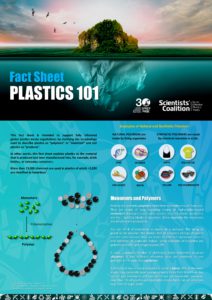
Intergovernmental Negotiating Committee on Plastic Pollution - Technical Resource for Pacific Island Courtiers
INC Fact Sheet: Plastics 101
This fact sheet is intended to support fully informed global plastics treaty negotiations by clarifying the terminology used to describe plastics as “polymers” or “materials” and not plastics as “products”.
In other words, this fact sheet explains plastics as the material that is produced and later manufactured into, for example, drink bottles, or takeaway containers.
More than 13,000 chemicals are used in plastics of which >3,200 are classified as hazardous1
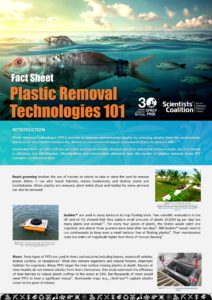
Intergovernmental Negotiating Committee on Plastic Pollution - Technical Resource for Pacific Island Courtiers
INC Fact Sheet: Plastic Removal Technologies 101
Plastic Removal Technologies (PRTs) promise to improve environmental quality by removing plastics from the environment, but they can also threaten biodiversity. Almost no environmental impact assessments (EIAs) are done on PRTs.
Unselective PRTs can alter habitats and catch plants and animals. Manual collection selectively removes plastic, but it is limited in efficiency and effectiveness. Municipalities and communities ultimately bear the burden of plastics removal. Some PRT examples are discussed here.
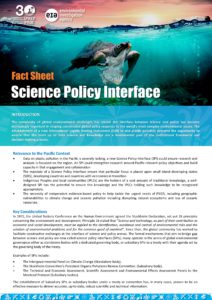
Intergovernmental Negotiating Committee on Plastic Pollution - Technical Resource for Pacific Island Courtiers
INC Fact Sheet: Science Policy Interface
(Publications under review and may be updated prior to 30 September)
The complexity of global environmental challenges has meant the interface between science and policy has become increasingly important in shaping coordinated global policy response to the world’s most complex environmental issues.
The establishment of a new International Legally Binding Instrument (ILBI) to end plastic pollution presents the opportunity to ensure that the most up to date science and knowledge are a fundamental part of the institutional framework and decision-making process.
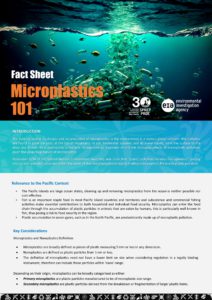
Intergovernmental Negotiating Committee on Plastic Pollution - Technical Resource for Pacific Island Courtiers
INC Fact Sheet: Microplastics 101
The ever-increasing discharges and accumulation of microplastics in the environment is a serious global concern. Microplastics are found in polar ice caps, at the top of mountains, in soil, freshwater systems, and all ocean basins, from the surface to the deep sea. Ocean life is particularly vulnerable to exposure to, ingestion of and the damaging effects of microplastic pollution, given the ubiquitous nature of microplastics.
Resolution 5/14 of the United Nations Environment Assembly was clear that “plastic pollution includes microplastics,” placing microplastic pollution squarely within the remit of the new international legally binding instrument (ILBI) to end plastic pollution.
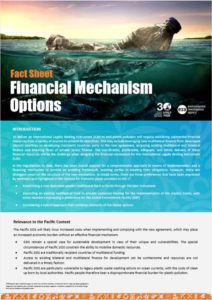
Intergovernmental Negotiating Committee on Plastic Pollution - Technical Resource for Pacific Island Courtiers
INC Fact Sheet: Financial Mechanism Options
To deliver an International Legally Binding Instrument (ILBI) to end plastic pollution will require mobilising substantial financial resources from a variety of sources to achieve its objectives. This may include leveraging new multilateral finance from developed (donor) countries to developing (recipient) countries party to the new agreement, accessing existing multilateral and bilateral finance and ensuring flows of private sector finance. The coordinated, predictable, adequate, and timely delivery of these financial resources will be the challenge when designing the financial mechanism for the International Legally Binding Instrument (ILBI).
In the negotiations to date, there has been overall support for a comprehensive approach to means of implementation and a financing mechanism to provide an enabling framework, assisting parties in meeting their obligations. However, there are divergent views on the structure of the new mechanism. In broad terms, there are three preferences that have been expressed by members and highlighted in the Options for Elements paper provided to INC-
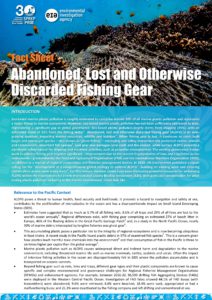
Intergovernmental Negotiating Committee on Plastic Pollution - Technical Resource for Pacific Island Courtiers
INC Fact Sheet: Abandoned, Lost and Otherwise Discarded Fishing Gear
Sea-based marine plastic pollution is roughly estimated to comprise around 20% of all marine plastic pollution and represents a major threat to marine ecosystems. However, sea-based marine plastic pollution has not been sufficiently addressed to date, representing a significant gap in global governance. Sea-based plastic pollution largely stems from shipping (35%), with an estimated share of 65% from the fishing sector.
Abandoned, lost and otherwise discarded fishing gear (ALDFG) is an ever-growing problem, impacting marine resources, wildlife and habitats. When fishing gear is lost, it continues to catch both target and non-target species – also known as ‘ghost-fishing’ – entangling and killing threatened and protected marine animals and commercially important fish species.
Lost gear also damages coral reefs and the seabed, while surface ALDFG presents a significant safety hazard for shipping and maritime activities, such as propeller entanglement. The existing governance framework to address fishing gear requires significant improvement due to the current fragmentation of laws and regulation across instruments – predominantly the Food and Agricultural Organisation (FAO) and the International Maritime Organisation (IMO), in addition to a myriad of regional conventions and fisheries management bodies. In 2019, UN Environment published a report calling for the “development of a comprehensive global strategy to address ALDFG”, building on existing work and ensuring coordination across several key areas4. For this reason, member states have been discussing potential measures for addressing ALDFG within the negotiations for a new International Legally Binding Instrument (ILBI), with particular consideration for what ending plastic pollution ‘including in the marine environment’ could look like.
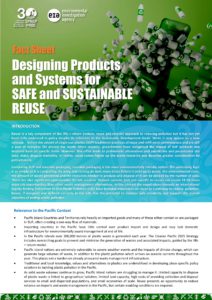
Intergovernmental Negotiating Committee on Plastic Pollution - Technical Resource for Pacific Island Courtiers
INC Fact Sheet Designing Products and Systems for Safe and Sustainable Reuse
(Publications under review and may be updated prior to 30 September)
Reuse is a key component of the 3Rs + return (reduce, reuse and recycle) approach to reducing pollution but it has not yet been fully embraced in policy despite its reference in the Sustainable Development Goals. While it may appear as a new concept, before the advent of single-use plastics (SUP) traditional practices of reuse and refill were commonplace and are still a part of everyday life around the world. More recently, governments have recognised the impact of SUP products and imposed bans on specific items. However, this often leads to problematic alternatives and substitutes and perpetuates the take, make, dispose mentality. In reality, reuse comes higher up the waste hierarchy and deserves greater consideration by policymakers.
Comparing SUP and reusable packaging, reusable packaging is the more environmentally friendly option. The underlying logic is as simple as it is compelling: by using and reusing an item many times before it ends up as waste, the environmental costs, the amount of waste generated and the resources needed to produce and dispose of it can be divided by the number of uses. There are also significant opportunities for job creation. Deposit systems (not just specific to reuse) can create 11-38 times more job opportunities than other waste management alternatives. In this context the negotiations towards an International Legally Binding Instrument to End Plastic Pollution (ILBI) have included discussions on reuse as a pathway to reduce pollution. Reuse, if designed and defined correctly in the ILBI, has the potential to increase safe circularity and support the overall objective of ending plastic pollution.
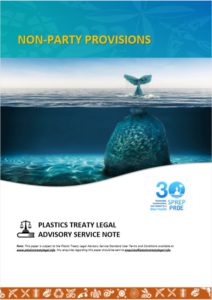
Intergovernmental Negotiating Committee on Plastic Pollution - Technical Resource for Pacific Island Courtiers
INC Plastics Treaty Legal Advisory Service Note: Non-Party Provisions
(Publications under review and may be updated prior to 30 September)
The inclusion of ‘Non-party provisions’ in a Plastics Treaty could have an important influence on plastic production within nations that do not become a party to the Treaty.
This would be particularly so if there was a critical mass of State Parties representing a large plastic consumer market to create an incentive for plastic producers in Non-party States to change their overall production practices to meet the requirements of selling into those markets (i.e., to produce less environmentally harmful plastic products, whether for consumption in State Parties or Non-party States).
Non-party provisions could also influence downstream activities within Non-party nations.
This note summarises a range of precedents in multilateral treaties for Non-party provisions, along with advantages and disadvantages of Non-party provisions.
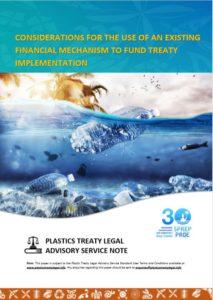
Intergovernmental Negotiating Committee on Plastic Pollution - Technical Resource for Pacific Island Courtiers
INC Plastics Treaty Legal Advisory Service Note: Considerations for the use of an existing Financial Mechanism to fund Treaty Implementation
(Publications under review and may be updated prior to 30 September)
At INC-2, states expressed divergent views on whether a new dedicated multilateral fund should be established by the new treaty and/or whether existing financing mechanisms should be leveraged, such as the Global Environment Facility – possibly through a dedicated window.
This note considers existing multilateral financial mechanisms that may be suitable for providing finance to assist developing states to implement a plastics treaty, and the advantages and disadvantages of using an existing mechanism as opposed to establishing a new mechanism.

Intergovernmental Negotiating Committee on Plastic Pollution - Technical Resource for Pacific Island Courtiers
INC Technical Note: World Trade Organization Rules and Key Elements for Consideration in the Context of a Treaty to End Plastic Pollution
Ahead of the second session of the Intergovernmental Negotiating Committee (INC-2) to develop an international legally binding instrument on plastic pollution, including in the marine environment (plastics treaty), there are clear indications that trade restrictions1 and requirements are to be part of the discussions, as indicated by many pre-INC2 State submissions, including non-party trade provisions (see CIEL’s brief on non-party trade provisions).2
Concurrently, some States have raised the question of compatibility between possible provisions of the future plastics treaty and World Trade Organization (WTO) rules.3 Since the inception of the WTO, a number of principles have become part of the core of international trade law under its jurisdiction. Critical elements of these rules include: (i) the non-discrimination principle;4 (ii) the most-favored-nation (MFN) principle5 and (iii) the national treatment principle.6 However, those principles do not preclude or impede States from prohibiting, restricting, or conditioning trade within the plastics treaty. Many multilateral environmental agreements (MEAs) have included trade and traderelated provisions,7 including trade restrictions, and none have triggered WTO disputes.8 In fact, MEAs that contain trade provisions harmonize the approach to an environmental problem, avoiding legal fragmentation and plausible WTO challenges.
This brief examines the question of consistency or compatibility of the incoming plastics treaty with WTO rules, with the understanding that the treaty negotiation process is still very much ongoing. It also provides key recommendations for future framing of the plastic treaty’s terms to address the essential interlinkages between plastic pollution and international trade in advance of INC-2.
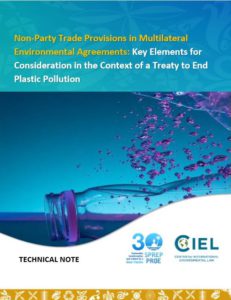
Intergovernmental Negotiating Committee on Plastic Pollution - Technical Resource for Pacific Island Courtiers
INC Technical Note: Non-Party Trade Provisions in Multilateral Environmental Agreements-Key Elements for Consideration in the Context of a Treaty to End Plastic Pollution
Multilateral environmental agreements (MEAs) aim to address environmental issues of global concern by creating uniform and streamlined approaches and rules that apply to all parties. Treaties serve as agreements between two (or more) States that enter into an agreement, thus creating specific obligations and rights for those parties. It is generally recognized that a treaty does not create either obligations or rights for a third, non-party State without its consent.
Obligations only arise for a third State if that State expressly accepts that obligation in writing.1 The more States become party to any specific agreement, the greater the chances for the agreement to become effective. Conversely, States that are not party to an agreement can also create specific challenges for its effectiveness. Therefore, it is common for treaties, including MEAs, to include so-called non-party provisions. These provisions typically set out how a party to a treaty should interact with ‘non-party’ States, promote the ratification of the agreement and deal with the specific challenges presented by non-parties. While all provisions aim to support the efficacy of a treaty, non-party provisions take various forms. The most commonly used are provisions that:
● Require parties to encourage non-parties to become parties; and
● Impose trade restrictions on parties in their dealing with non-parties, unless those non-parties conform to the requirements of the relevant treaty (non-party trade provisions).
Plastic pollution is an issue of global concern and every step along the life cycle of plastics entails global supply chains. The future treaty to end plastic pollution will thus require non-party provisions to be truly effective. It should incentivize ratification by the greatest number of countries possible, create a level playing field, and avoid providing benefits for non-parties (also referred to as ‘free-riders’). Because of global supply chains, developing nonparty provisions, specifically around trade issues, is paramount.
This brief provides an introduction to trade provisions involving non-parties. The Annex includes specific examples from other MEAs.
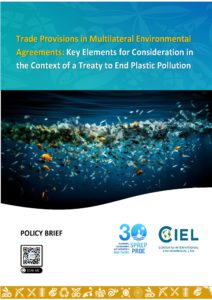
Intergovernmental Negotiating Committee on Plastic Pollution - Technical Resource for Pacific Island Courtiers
INC Policy Brief: Trade Provisions in Multilateral Environmental Agreements-Key Elements for Consideration in the Context of a Treaty to End Plastic Pollution
Plastics trade is an essential component of discussions to develop an international legally binding instrument to end plastic pollution, for three reasons:
1. Plastic feedstocks, polymers, additives, plastic pellets, plastic products, and waste are largely traded internationally1 and the liberalization2 of trade in plastics and their feedstocks supports the rise in production and consumption of plastics, accelerating the plastic crisis;
2. Trade in plastics acts as a conveyor belt for the spread of products, packing and packaging responsible for plastic pollution, including micro- and nanoplastics around the world;3 and
3. Trade in plastics products and products packaged in plastic adds to the waste management burden that importing countries face.
Additionally, Global trade in plastic is immense. Plastics imports and exports in “primary, intermediate and final forms of plastics [represent] up to more than US$1 trillion in 2018 or 5% of the total value of global trade.”4 In 2020, there were 369 million tons of plastics traded - $1,2 trillion in value -, a significant increase from the previous years (UNCTAD, 2022d).
UNEP also identified trade as one of the key elements to address (through the full life cycle of plastics) in its Plastics Science document published in preparation of the first Intergovernmental Negotiating Committee (INC1) (UNEP/PP/INC.1/7).5 As measures for achieving the strategic goals for systems change, UNEP proposed among others to include (i) bans of specific final goods as well as problematic and unnecessary polymers and additives; as well as restrictions and phase out of harmful substances, (ii) taxes/tariffs related to upstream, and midstream activities and products; (iii) removal of fossil fuel subsidies; and (iv) customs duties.6
Given this importance, and to ensure that the goal of ending plastic pollution is successfully achieved, it will be essential (i) to recognize the contribution and role of trade in plastic pollution and (ii) ensure that the plastics treaty includes trade-related measures as core obligations.7
Newsletter Subscription
Would you like to subscribe to our quarterly programme newsletter-The Connection?
We care about the protection of your data. Read our Privacy Policy.
Newsletter Signup
To sign up to our newsletter, enter the information below and we will add you to our mailing list for all future regional and project updates.
